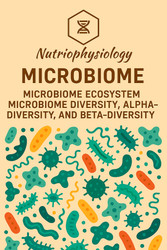Microbiome Diversity is Essential
Posted by Dr. Tatiana Pouncy on Nov 14th 2024
Understanding Microbiome Diversity: Why It Matters for Your Health
When we talk about diversity in an ecological context, two key concepts emerge: alpha-diversity and beta-diversity. These terms are not just relevant to forests and oceans—they’re essential to understanding the health of your gut microbiome.
Alpha-Diversity: Your Internal Ecosystem
Alpha-diversity refers to the average variety of species within a single environment. In the context of your gut, it represents the number of distinct bacterial species living inside you. A higher alpha-diversity is associated with better health outcomes, greater resilience, and improved metabolic and immune function. Simply put, the more diverse your gut bacteria, the stronger your internal ecosystem.
Beta-Diversity: Comparing Ecosystems
Beta-diversity measures the difference in species between two ecosystems. When applied to gut health, it compares your microbiome to that of a healthy population. You might have high alpha-diversity, but if your beta-diversity is low, it means your microbial composition differs significantly from what’s considered optimal. This insight can guide personalized strategies to improve your microbial balance—especially by focusing on keystone species that support overall resilience.
Tip: Don’t aim for perfection—aim for progress. Microbiome diversity is dynamic and can be nurtured over time.
Resilience of the Microbiome: The Resistome Occurrence Index
The Resistome Occurrence Index is a measure of your microbiome’s richness and stability. It reflects how well your gut bacteria can produce natural antimicrobials and compete with harmful microbes—a process known as competitive exclusion. A low score may indicate poor microbial resilience, leaving your gut vulnerable to imbalance and infection.
A robust microbiome thrives on healthy competition. Just like a sailboat needs wind resistance to move forward, your gut needs microbial diversity to function optimally. Without it, your microbiome may struggle to protect you from pathogens and maintain balance.
Managing Gut Infections with BiomeFx
BiomeFx analyzes over 25 pathogens and evaluates their relative abundance—not just their presence. Unlike traditional stool tests, BiomeFx considers how pathogens interact with the rest of your microbiome. A small number of pathogens isn’t necessarily harmful; it’s their dominance that matters.
By assessing microbial balance, strength, and resistance, BiomeFx helps create a personalized strategy to restore harmony in your gut. It also uses whole genome sequencing, which offers greater accuracy and fewer false positives compared to older testing methods.
✅ Key Takeaways
- Alpha-diversity reflects your internal microbial variety.
- Beta-diversity compares your microbiome to healthy populations.
- Resistome Index measures microbial resilience and competitive strength.
- BiomeFx provides a precise, personalized approach to gut health.

